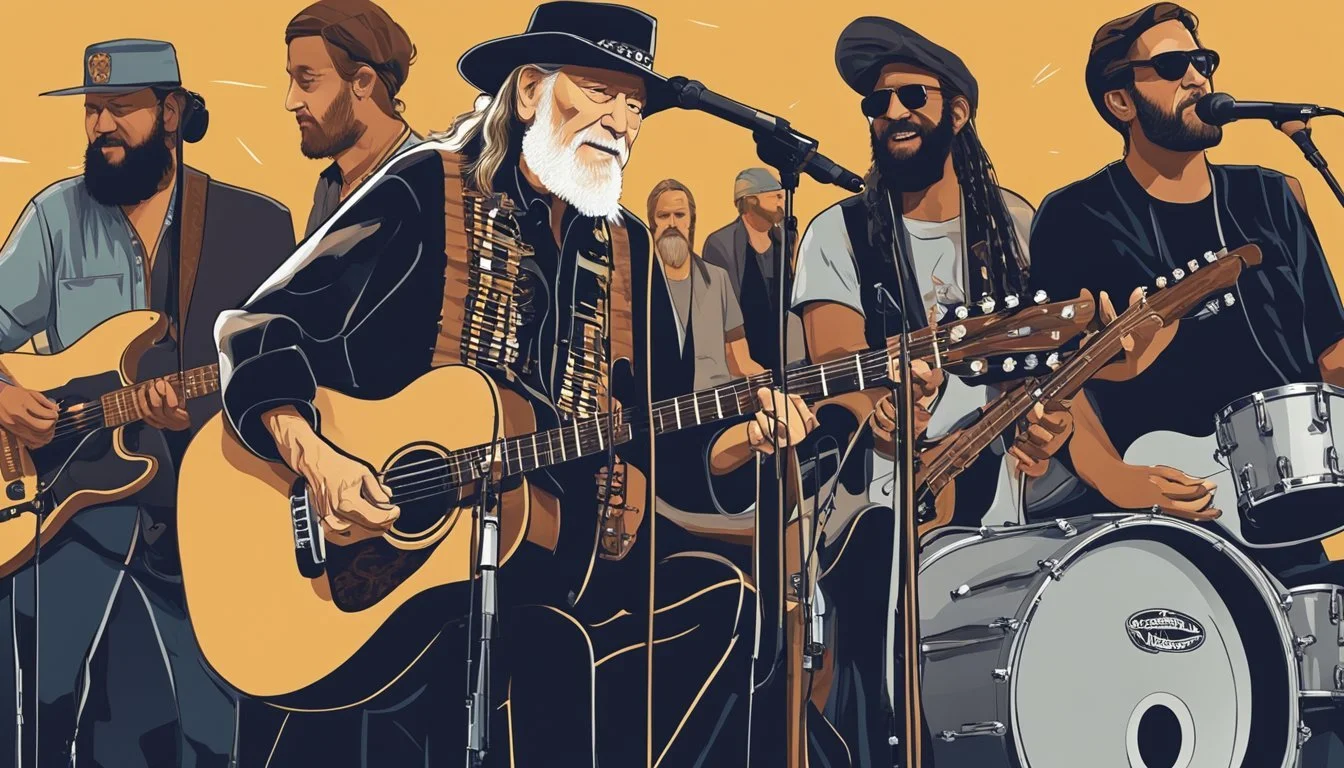Personal Struggles and Triumphs in "Willie Nelson & Family"
A Raw Look at Country Music's Icon
Willie Nelson's life story unfolds in the new Paramount+ docuseries "Willie Nelson & Family," offering an intimate look at the country music icon's personal struggles and triumphs. The four-part series delves into Nelson's complex relationships, financial hardships, and creative journey.
The documentary reveals Nelson's experiences with multiple marriages, affairs, and the devastating loss of his son. It also explores his well-known battle with the IRS, which led to significant financial difficulties. These personal challenges provide context for Nelson's resilience and enduring impact on the music industry.
"Willie Nelson & Family" combines archival footage, interviews, and Nelson's own reflections to paint a comprehensive picture of his 91 years. The series showcases his evolution as an artist, from his early days as a songwriter to becoming a revered performer and activist. It offers fans and newcomers alike a deeper understanding of the man behind the music.
The Early Years
Willie Nelson's journey to stardom began in his home state of Texas before taking him to the bustling music scene of Nashville. His formative years laid the foundation for his unique musical style and shaped the family bonds that would become central to his career.
Rising through the Ranks in Nashville
Willie Nelson arrived in Nashville in 1960, determined to make his mark as a songwriter. He quickly gained recognition for his pen, writing hits like "Crazy" for Patsy Cline. Despite this success, Nelson struggled to break through as a performer. His unconventional vocal style and eclectic musical approach didn't fit the polished Nashville sound of the era.
Nelson signed with Liberty Records but faced disappointment when his albums failed to chart. He continued to write for other artists while honing his craft. This period taught Nelson valuable lessons about the music industry and his own artistic vision.
Formation of Family and Musical Roots
Willie's family played a crucial role in his musical development. His sister Bobbie Nelson, an accomplished pianist, became a key member of his band. Their musical connection, forged in childhood, remained strong throughout their careers.
In 1963, Nelson married Shirley Collie, a singer and guitarist. The couple performed together, blending their talents on stage and in the studio. This partnership further shaped Nelson's sound and stage presence.
Nelson's Texas roots continued to influence his music, even as he adapted to the Nashville scene. He incorporated elements of western swing, honky-tonk, and folk into his songwriting, creating a distinctive style that would later define outlaw country.
Career Milestones
Willie Nelson's career spans decades, marked by groundbreaking albums, iconic performances, and influential advocacy work. His artistic vision and unique style have left an indelible mark on country music and popular culture.
Creating Signature Albums
Willie Nelson's discography contains several landmark albums that redefined country music. "Shotgun Willie" (1973) marked a turning point, showcasing his distinctive sound and songwriting. The album blended country, rock, and folk influences, establishing Nelson as a genre-defying artist.
"Red Headed Stranger" (1975) solidified Nelson's status as a country music legend. This concept album tells a compelling story through its interconnected songs. It became a commercial and critical success, earning platinum certification and widespread acclaim.
Nelson's prolific output continued with albums like "Stardust" (1978), which featured his interpretations of pop standards. This unexpected move demonstrated his versatility and expanded his audience beyond traditional country fans.
Trigger: The Iconic Guitar
Willie Nelson's guitar, named Trigger, has become synonymous with his musical identity. The Martin N-20 classical guitar has been his constant companion since 1969. Trigger's distinctive sound and worn appearance are integral to Nelson's performances.
The guitar's unique tone contributes to Nelson's recognizable style. Its nylon strings and classical design allow for his signature fingerpicking technique. Over the years, Trigger has acquired a large hole in its body from Nelson's persistent playing.
Nelson's devotion to Trigger is legendary. He often quips that the guitar will be the last to go when he retires. This relationship between artist and instrument has become an essential part of Willie Nelson's musical legacy.
Farm Aid and Advocacy
In 1985, Willie Nelson co-founded Farm Aid, a benefit concert to support American farmers. The inaugural event featured performances by Nelson, John Mellencamp, and Neil Young. Farm Aid has since become an annual tradition, raising millions of dollars for family farmers.
Nelson's advocacy extends beyond the concert stage. He has been a vocal supporter of sustainable agriculture and small family farms. His efforts have raised awareness about the challenges facing rural communities and the importance of local food systems.
Farm Aid's impact goes beyond financial support. It has become a platform for educating the public about food issues and promoting environmentally friendly farming practices. Nelson's commitment to this cause has made him a respected voice in agricultural advocacy.
Personal Life and Relationships
Willie Nelson's personal life has been marked by multiple marriages, strong family bonds, and resilience in the face of adversity. His relationships and personal struggles have profoundly influenced his music and career.
Marriages and Family Bonds
Willie Nelson has been married four times. His first marriage was to Martha Jewel, followed by Shirley Collie. Nelson's third wife was Connie Nelson, with whom he had a tumultuous relationship.
In 1991, Nelson married Annie D'Angelo, describing this union as "the smartest thing" he ever did. The couple has remained together for over three decades.
Nelson has fathered eight children throughout his marriages. His family plays a significant role in his life and career, often performing with him and supporting his musical endeavors.
Triumph Over Adversity
Nelson has faced numerous personal challenges, including the loss of his son Billy to suicide in 1991. This tragic event deeply affected the singer and his family.
Financial struggles have also plagued Nelson. In the 1990s, he faced a $32 million debt to the IRS. Nelson responded by releasing the album "The IRS Tapes: Who'll Buy My Memories?" to help pay off his debt.
Despite these setbacks, Nelson has shown remarkable resilience. He continued to tour, record music, and maintain his status as a country music icon. His ability to overcome adversity has inspired many fans and fellow musicians.
Professional and Financial Ups and Downs
Willie Nelson faced significant challenges in his music career and finances. His journey included periods of hardship and remarkable comebacks, shaped by industry pressures and business decisions.
Navigating Industry Challenges
Willie Nelson's career trajectory was far from smooth. In the late 1960s, he struggled to fit into the Nashville music scene. His unconventional style often clashed with industry expectations. Nelson's move to Austin, Texas in the early 1970s marked a turning point. There, he found a more receptive audience for his unique blend of country, jazz, and folk.
The 1980s brought financial turmoil. Nelson owed the IRS millions in back taxes. This debt stemmed from poor financial management and questionable tax shelters. The situation forced him to sell many assets, including his home and studio.
Recovery and Business Management
Nelson tackled his financial woes head-on. He released the album "The IRS Tapes: Who'll Buy My Memories?" in 1992. The proceeds went directly to paying off his tax debt. This creative solution showcased Nelson's resilience and business acumen.
Mark Rothbaum became Nelson's manager in the 1970s. Under Rothbaum's guidance, Nelson's career stabilized. They focused on strategic touring and diverse musical projects. This approach helped rebuild Nelson's finances and expand his fanbase.
Nelson's "Willie World" brand grew to include biodiesel ventures and marijuana businesses. These endeavors diversified his income streams. Today, Nelson's financial outlook is much improved, thanks to smart management and his enduring musical legacy.
Legacy and Influence
Willie Nelson's impact on music and culture extends far beyond his own career. His unique style and enduring popularity have shaped country music and influenced artists across genres for decades.
The Impact of Willie Nelson's Music
Willie Nelson's distinctive sound and songwriting have left an indelible mark on country music. His unconventional phrasing and jazz-influenced guitar playing redefined the genre's boundaries. Nelson's albums like "Red Headed Stranger" and "Stardust" achieved critical and commercial success, cementing his status as a musical icon.
His advocacy for social causes, particularly farm aid, has inspired many artists to use their platforms for activism. Nelson's collaborations with artists from various genres have helped bridge musical divides and introduce his work to new audiences.
Inspiring New Generations of Artists
Nelson's influence extends to younger musicians who cite him as a major inspiration. Artists like Kenny Chesney and Lukas Nelson, Willie's son, have openly acknowledged his impact on their careers. The documentary series "Willie Nelson & Family" features interviews with admirers such as Dolly Parton and Shelby Lynne, highlighting his lasting legacy.
Producer Don Was praises Nelson's authenticity and artistic integrity, qualities that continue to resonate with emerging talent. Nelson's ability to remain relevant and collaborate with contemporary artists well into his 90s serves as a testament to his enduring influence on the music industry.
Willie Nelson & Family: The Documentary
"Willie Nelson & Family" offers an intimate look at the legendary musician's life and career through rare footage and interviews. The four-part series premiered on Paramount+ in December 2023.
Behind the Scenes with Oren Moverman and Thom Zimny
Directors Oren Moverman and Thom Zimny brought their unique perspectives to the project. Moverman, known for his work on music biopics, and Zimny, with his experience in documentary filmmaking, crafted a comprehensive narrative of Nelson's journey.
The filmmakers gained unprecedented access to Willie's personal archives and inner circle. Their collaborative approach allowed them to weave together different aspects of Nelson's life, from his humble beginnings to his rise as a country music icon.
Exploring the Archival Footage
The documentary features a wealth of previously unseen archival material. Rare concert recordings showcase Willie's evolving musical style over the decades.
Home videos and backstage footage provide glimpses into Nelson's personal life and relationships. These intimate moments help paint a fuller picture of the man behind the music.
The filmmakers also included historical footage to contextualize Nelson's impact on American culture and music. This blend of personal and public archives creates a rich visual tapestry of Willie's life.
Interviews: A Window to Willie's World
The series features interviews with Willie Nelson himself, offering candid reflections on his life and career. Family members, including his sister Bobbie, provide personal insights into Willie's upbringing and early musical influences.
Fellow musicians like Dolly Parton, Kenny Chesney, and Sheryl Crow share stories of collaboration and friendship. Their perspectives highlight Nelson's influence on country music and beyond.
Industry insiders and music historians offer analysis of Willie's artistic innovations and cultural impact. These diverse voices create a multifaceted portrait of Nelson as an artist, activist, and cultural icon.
Challenges and Triumphs
Willie Nelson's journey has been marked by personal struggles and remarkable resilience. His ability to overcome adversity and maintain his artistic vision has solidified his status as a music legend.
Overcoming Personal Struggles
Willie Nelson faced significant challenges throughout his life. His marriage to Martha Jewel Matthews was tumultuous, marred by alcohol abuse and infidelity. The couple divorced in 1962 after a decade of marriage. In 1970, Nelson's house in Nashville burned down, destroying many of his possessions and original song recordings.
Nelson battled depression during his early career, struggling to find success as a songwriter in Nashville. He even considered quitting music altogether. Financial troubles plagued him as well, culminating in a well-publicized dispute with the IRS in the 1990s.
In 2019, Nelson experienced a health scare when he suffered a lung collapse. This forced him to cancel several tour dates and focus on recovery.
Enduring Legacy of The Red Headed Stranger
Despite these setbacks, Willie Nelson's resilience and talent propelled him to legendary status. His 1975 album "The Red Headed Stranger" became a landmark in country music, showcasing Nelson's unique storytelling abilities and cross-genre appeal.
Nelson's distinctive voice and guitar playing style have influenced generations of musicians. His advocacy for causes like farm aid and marijuana legalization has further cemented his cultural impact.
The recent docuseries "Willie Nelson & Family" on Paramount+ offers an in-depth look at Nelson's life and career. It features rare footage and interviews with fellow artists, providing insight into the man behind the music.
At 91 years old, Nelson continues to perform and release new music, a testament to his enduring passion and creativity.
Health and Well-Being
Willie Nelson's journey through life has been marked by significant health challenges and personal struggles. His resilience and unique coping mechanisms have played a crucial role in his longevity and career success.
Struggles with Physical Health
Willie Nelson has faced numerous physical health issues throughout his life. In the 1970s, he underwent lung surgery due to complications from years of smoking. Nelson also battled pneumonia multiple times, which led to canceled tours and hospital stays. In 2015, he had stem cell therapy to improve his lung health.
Nelson's relationship with marijuana is well-documented. He credits cannabis for helping him quit cigarettes and manage pain. However, this habit has occasionally led to legal troubles, including arrests for possession.
Despite these challenges, Nelson maintains an active lifestyle. He practices martial arts, particularly Tae Kwon Do, which he believes contributes to his overall fitness and longevity.
Mental Health and Coping Mechanisms
Willie Nelson's mental health journey has been complex. He has been open about his struggles with depression and suicidal thoughts, particularly during his early career. In the 1960s, Nelson experienced a low point where he contemplated ending his life.
Music has been Nelson's primary coping mechanism. He often turned to songwriting as a form of therapy during difficult times. His ability to channel emotions into his art has been a key factor in managing his mental health.
Nelson's "Drinking Days" were a challenging period. He struggled with alcohol abuse, which affected his personal relationships and career. However, he eventually overcame this addiction, demonstrating remarkable resilience.
Anger management has also been part of Nelson's journey. He learned to control his temper over the years, adopting a more laid-back approach to life and its challenges.








